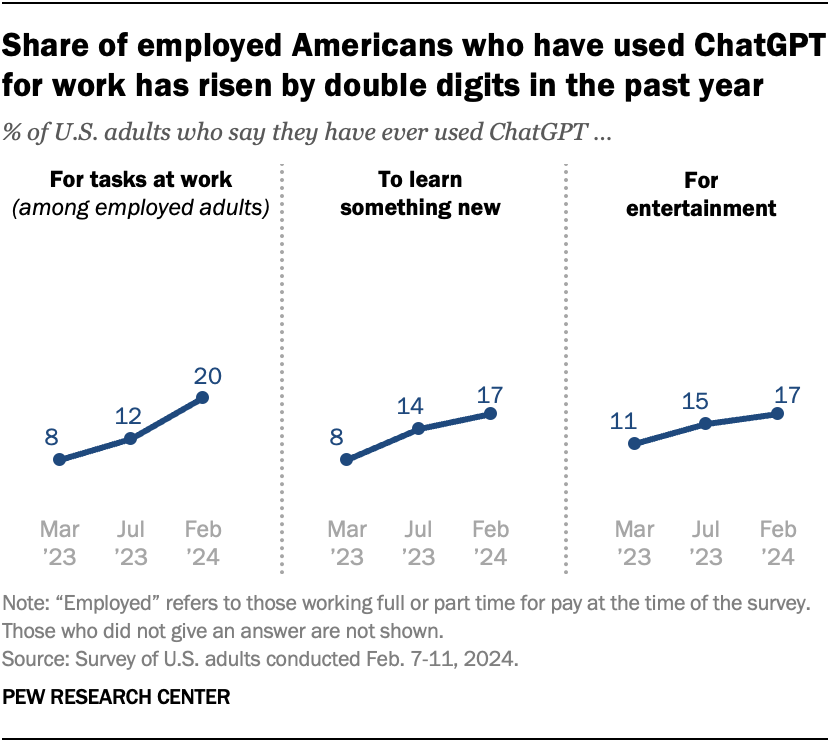As we venture further into the digital age, a hot topic is the resistance to artificial intelligence (AI) and the potential societal fracture this may cause. The divide between those who resist AI and those who embrace it is becoming increasingly apparent. This article explores how pervasive AI is in our everyday lives, discussing whether we can live without AI and the internet, and examining the relationship between AI and the internet.
The Landscape of AI Resistance Vs AI Adoption
Just like any other innovation, AI has its supporters and skeptics. The concept of AI resistance is not a new phenomenon. Throughout history, new technologies often faced resistance before they became an essential part of our daily lives. The same pattern appears to be unfolding with AI.
For instance, when the internet was first introduced, it was met with skepticism. According to Pew Research Center, only 14% of U.S. adults had the internet in 1995. Most were using slow, dial-up modem connections—just 2% of internet users were comparatively screaming along with an expensive 28.8 modem. However, that number skyrocketed to 87% by 2014.
In contrast, AI technology is swiftly becoming an integral part of our lives, transforming sectors ranging from healthcare and education to finance and transportation. According to a more recent study by Pew Research Center, usage of AI chatbots, specifically ChatGPT, is experiencing a surge among younger demographics. It's revealed that there's a 43% usage rate among young adults in the US, marking a 10% increase from the previous summer. While usage among the age groups 30-49 and 50-64 has seen a slight rise, they still lag behind their younger counterparts. A mere 6% of the 65 and above age group have interacted with ChatGPT.

Can AI be Separated From Everyday Life?
AI has permeated our lives to such an extent that it has become virtually inextricable from our day-to-day activities. Whether it's using a virtual assistant like Siri or Alexa, receiving personalized recommendations on Netflix, or even optimizing your phone's battery life, AI is already ubiquitous in our everyday lives.
Many resist the rise of AI, often due to a lack of understanding about its pervasive presence in our daily lives. The adage "AI is coming" is somewhat misleading as AI has already integrated itself into our routine. AI's influence is growing - it is projected to impact or alter a significant number of jobs, equating to around 6.9% or 11.08 million positions. This shift reflects an enhancement of work rather than a complete replacement, signifying the transformative potential of generative AI, rather than its solely disruptive capacity.
For those new to this technology, starting a learning journey is essential. Consider enrolling in courses like the free ChatGPT for Work: The Interactive Course, which offers a practical introduction to using AI in professional settings. This course is designed to make AI approachable and applicable, featuring interactive exercises and real-world applications.

AI and the Internet, An Inseparable Duo
Attempting to separate AI from the internet is like trying to detach the warp threads from a woven fabric, near impossible. The internet relies heavily on AI algorithms for various operations, from search engines and social media feeds to spam filters and cybersecurity measures. Even by merely using the internet, we interact with AI technology.
According to a recent study, around 75% of internet traffic is driven by AI algorithms, reflecting their ubiquitous presence and importance. For instance, when we use a search engine like Google, we are interacting with AI. Its advanced algorithms parse our search terms, compare them with billions of web pages, and deliver the most relevant results in a fraction of a second. This remarkable efficiency is a testament to the power and utility of AI in our daily internet usage.
Crafting a Balanced Approach Towards AI
While it's crucial to be aware of the ethical issues and potential risks associated with AI, outright AI resistance might not be the best approach. A balanced perspective is key. It's about leveraging the benefits that AI provides while remaining cautious and informed about possible downsides.
Rejecting AI out of fear or ignorance may lead to missed opportunities. On the other hand, embracing AI blindly can potentially expose one to cyber threats and data privacy issues. Therefore, a balanced approach is conducive to reaping the benefits of AI while staying safe in the digital world.
AI Resistance is Futile?

It is indeed possible that a societal rift could form between those who resist AI and those who adopt it. However, as with any technological advancement, the key lies in understanding and finding a balance. AI is not a future prospect; it's our present reality. Adopting a balanced approach towards AI may be the solution to navigate this evolving digital landscape and mitigate the risk of a societal fracture due to AI resistance.

